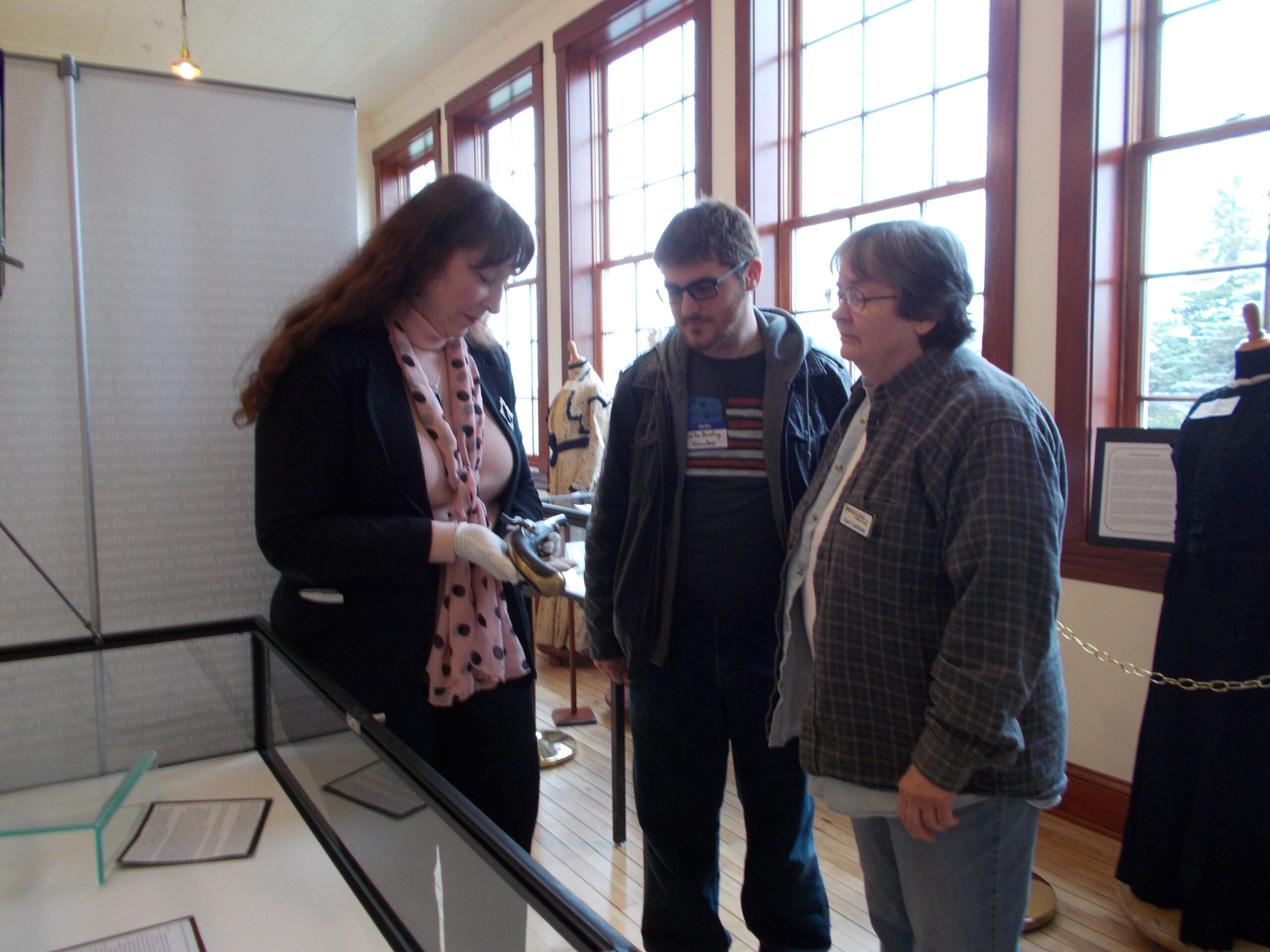
PRESQUE ISLE, Maine — The Presque Isle Historical Society’s Maysville Museum recently acquired three Civil War artifacts that further tell the story of Aroostook County’s involvement in the historic conflict.
The museum is now the permanent home of a diary and letter written by Harrison Robinson, a Presque Isle resident who was enlisted in the 15th Regiment Maine Infantry from Oct. 22, 1861 — six months after the war began — to July 14, 1866. The 74-page diary begins and ends on those dates and details his experiences throughout the war.
“In the beginning Harrison talks about how he walked all the way to Augusta to enlist and then walked to Portland to board a ship,” said Kim Smith, secretary and treasurer for the Presque Isle Historical Society. “He even kept a tally of how many times he was put on guard duty during battle.”
The historical society obtained the leather-bound diary and an accompanying letter written by Robinson after Walter Holak of New Hampshire contacted the nonprofit organization to say that his father, an avid Civil War collector, had the diary for many years. Holak had no idea how a diary from a Presque Isle resident could have made its way to New Hampshire, but he believed that the artifact needed to “come home.”
Throughout Robinson’s time with the 15th Regiment Infantry, he fought at Ship Island, Mississippi; Pensacola, Florida; and New Orleans; as well as in Texas, Virginia, Maryland, and Washington, D.C.; and at Harper’s Ferry, West Virginia. The regiment lost five men in battle and 343 to disease.
In a letter dated April 12, 1865, Robinson writes to his father near Summit Point, West Virginia, about how the regiment had “been on the move for several days” and had marched 24 miles to their current location. Robinson also references Confederate Gen. Robert E. Lee’s surrender in Virginia a mere three days earlier and expresses hope that the war will end soon.
“It’s an important part of history to have because it’s somebody’s first-person account of what they experienced. I get goosebumps every time I read it,” Smith said, about Robinson’s letter. “His writing is very poignant.”

The Maysville Museum is now home to three new Civil War artifacts: a 74-page diary from Harrison Robinson, dated from 1861 and 1866, a letter written by Robinson to his father and a Henry Aston Model 1842 Flintlock military pistol. (Melissa Lizotte)
After the war, Robinson came home to Presque Isle and opened a jewelry store on Bridge Street — now known as State Street — with fellow Civil War veteran Benjamin Owen, whose officer’s sword is also part of the Maysville Museum’s Civil War display. Robinson married Martha Villroy Chadwick, originally from Augusta, in 1867 and they had one daughter named Lulu Robinson.
Shortly after the historical society scheduled its first annual Civil War Trails Tour, meant to debut the Robinson diary and letter, Smith learned that two employees of the Caribou-based Soderberg Construction — Heather Golding and Jeannie Snyder — had found an antique pistol hidden within the walls of a home on the Brewer Road in Presque Isle that they’d been demolishing.
According to Carl Soderberg, owner of Soderberg Construction, Golding was the one who first spotted the gun and it was because of her keen observations that the pistol was discovered and not buried under a pile of rubble.
“This is the first time that an employee has found something of historical significance while on the job,” Soderberg said.
After Golding and Snyder brought the pistol to Soderberg, he contacted Scott Smith of Cavendish Farms, who recently purchased the land where the Brewer Road home stood. The men brought the pistol to local gun expert Jeff Hemphill of Presque Isle, who identified the antique as a Henry Aston Model 1842 Flintlock military pistol, the most common weapon that soldiers used during the Civil War.
While cleaning the pistol, Hemphill discovered that the gun was still loaded and able to discharge because the gunpowder and wadding used to hold the power in place had stayed dry during hundreds of years hidden within the walls of the Brewer Road home. Smith explained that the home had previously belonged to Simeon Smith, whose son Ansel served in the 6th Regiment Maine Infantry during the Civil War, but the historical society has not found any documents to prove who exactly might have used the gun and when.
“After those types of pistols were replaced by newer models, people often took out the ammunition and gave them to children to play with,” Smith said.
The Civil War had a great impact on Aroostook County, she noted, as 50 percent of the men from the region enlisted, leaving the women behind to tend to the large agricultural harvests that were already the major industry. An estimated 33 percent of those same men died and likely many of the ones who survived came home with physical and emotional wounds.
“The Civil War was the first time that the symptoms of post traumatic stress disorder were noticed among returning soldiers,” Smith said.
Both the Robinson artifacts and the pistol were unveiled during the historical society’s inaugural Civil War Trails Tour on Sept. 29 and are currently on display at the Maysville Museum. The museum is located at the corner of Brewer Road and Route 1 in Presque Isle and is open through October from 10 a.m. to 2 p.m. Monday through Saturday.







